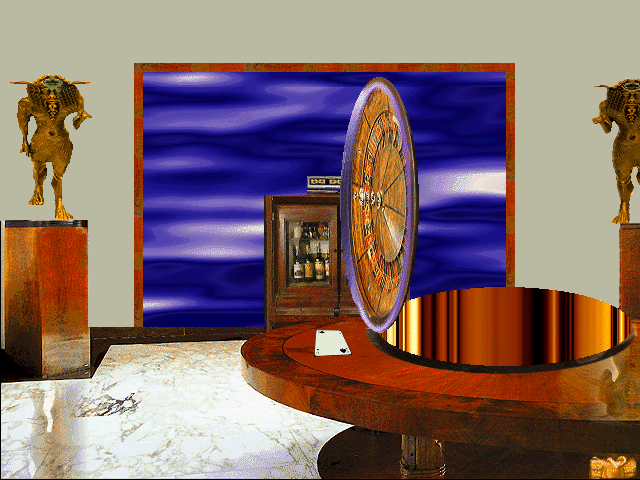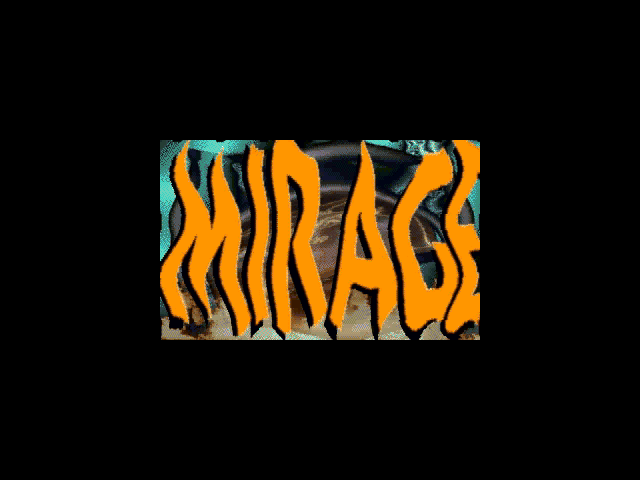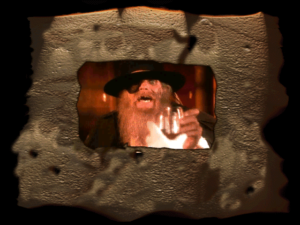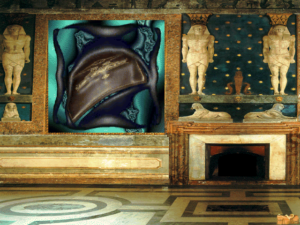Mirage 
Multimedia CD-ROM games – live-action games in particular – can have a bad reputation because it’s easy to dismiss them. They can be weird and obtuse, often told in a way that’s intentionally fragmented, and they’re rarely given the dignity of being appreciated on their own terms. Corny live-action games get lumped into the same category as multimedia art like Puppet Motel. They’re treated as these bizarre anachronistic objects that don’t deserve respect or patience. Yet these sorts of games, which seem the most confusing at first, can be the most rewarding if you give them a chance.
The tragedy of the surreal Western game Mirage is that it justifies those gut reactions. It’s the kind of nightmare fiasco that you’d imagine if you assumed the worst from the genre.
Mirage is set in a kaleidoscopic version of the Wild West, overrun with outlaws and ne’er-do-wells. The upstanding Lieutenant Shooter – that’s his real name – has been ambushed in the Mirage Desert, and his wife Jenny has been kidnapped. General Grisum of the U.S. Cavalry has dispatched you to bring justice to the West. “But be careful and remember, don’t always believe your eyes,” he says. “For nothing is real, it’s all a Mirage.”
“…or is it?” he adds unhelpfully.
As the name suggests, the Mirage Desert has a way of playing with reality, and as you search for Jenny, the world becomes more fragmented and more like an illusion. However, this is about as far as I can explain Mirage coherently, because it immediately turns into hallucinatory madness. The game rapidly moves between unrelated scenes, jumping from a casino to a desert to a saloon without attempting to transition between them. Doors materialize out of the ground, and in one particularly bizarre scene, a solid stone toilet appears in the middle of the desert and you climb into the toilet to continue forward.
To the extent that there’s any understandable narrative from this point on, it involves a Chinese brothel owner – a racist caricature performed by a white guy, of course – who has been scheming with the disgraced Sheriff Barnes, who was granted a “license to massacre” by the U.S. Cavalry. (What?!) The story is told in chopped-up, inscrutable video clips and diary pages which burst onto the screen, repeating the phrases “Do we have a deal?” and “U.S. Cavalry” as if those words have some inherent value. Most of the dialogue is inaudible or intentionally garbled. There’s also a character nicknamed The Shadow who’s just a dancing silhouette of a naked woman that will randomly show up, and that’s as much as the game cares to address that.
Structurally, Mirage has a lot in common with multimedia art CD-ROMs like Puppet Motel. (I’m loath to make that comparison, but it’s true!) The game is made from small interconnected scenes that contain fragments of events and characters, and as you explore, you have to piece them together for yourself. But that format doesn’t improve anything about a story that’s already been scrambled beyond recognition. Incoherent surrealism is still incoherent.
One of the other big differences with Mirage is that you can’t really explore this game freely at your own pace. You can die in Mirage, and the game actively wants you to kill you. Bandits will pop out from behind walls and shoot you; and the last traces of reality break down even further when the photo on a wanted poster tries to murder you too, like the outlaw shooting the camera at the end of The Great Train Robbery. Or sometimes, if you don’t follow the exact directions the developers had in mind for each scene – if you don’t find the hidden invisible objects or click everything the right order – you might get stuck or just suddenly die with no further explanation. The game might be incomprehensible, but at least it’s also extremely difficult.
What’s disappointing is that despite this onslaught of surrealism, there’s no sense of playfulness to it. Something so abrasively strange should at least be interesting, but because the game has so little energy, it’s difficult to enjoy the bizarre humor in moments like the bandit who shoots himself in confusion during a gunfight. Even the most creatively unusual scene, an upside-down swimming pool where the water runs on the ceiling, is devoid of any intrigue or emotion that would make it worth experiencing. The game feels inert, like it’s just going through the motions of being weird for the sake of it.

Welcome to The Den, a casino where the Egyptian statues dance and the roulette wheel flips open like a trash can lid
In search of anything to say about Mirage, I turned to the bonus CD-ROM, which features a behind-the-scenes video about the making of the game. This answered nothing. It’s just five minutes of out-of-context B-roll footage. Much of the video is composed of close-ups of cameras, audio equipment, and keyboards, plus a shot of a guy in a fedora spinning around in a desk chair. (For the record, that guy is Saint, and he was the game’s artist, composer, and assistant director.) You get the sense that they’re not forthcoming about something. The audio in all this footage has been replaced by easy listening music, and one shot of a clapboard has been superimposed with suspiciously fake text that says “Mirage Take One,” like they’re covering up the real name of the production.
It turns out that’s because Mirage was secretly adapted from a pornographic Western film from 1994 called Shame. The developers, who also produced the movie, did their best to conceal this and avoided any references to the original film. At the time the game was released, I don’t think there would have been any way to tell, but it’s obvious now that you can compare the cast and production credits on IMDb. (Both the game and the movie tellingly credit the same crew member as “Winnebago Driver.”) Perhaps Mirage is so incoherent because the producers were attempting to make a game by cutting around the adult content in the movie, leaving them with a meaningless series of clips with no discernible narrative.
That explains the game’s stilted production quality and its rampant misogyny, but that alone doesn’t account for how totally, holistically inept it is. A game as misguided as Mirage would only have made the slightest financial or creative sense during the boom of the 90s CD-ROM era, when an inexperienced developer could cobble together an interactive movie and bring it to the market as a physical product, and it’s a pretty hard knock against the multimedia genre that Mirage is at times hard to distinguish from a more competent title.
Even after completing Mirage, I still genuinely do not understand what it was trying to accomplish. The truth is that there may be nothing here to understand. Mirage is too unintelligible to warrant an explanation. This is Westworld by way of the maximalist chaos of Too Many Cooks. It’s basically nonsense to anybody except that guy in the fedora.





Please do a full longplay of this and put it on youtube, I would love to see this disaster
Great review. It’s a pity they went for the shock/weirdness leaving out the feelings and meaning. It could be something more than incoherent porn leftovers. That upside down pool idea is spectacular.